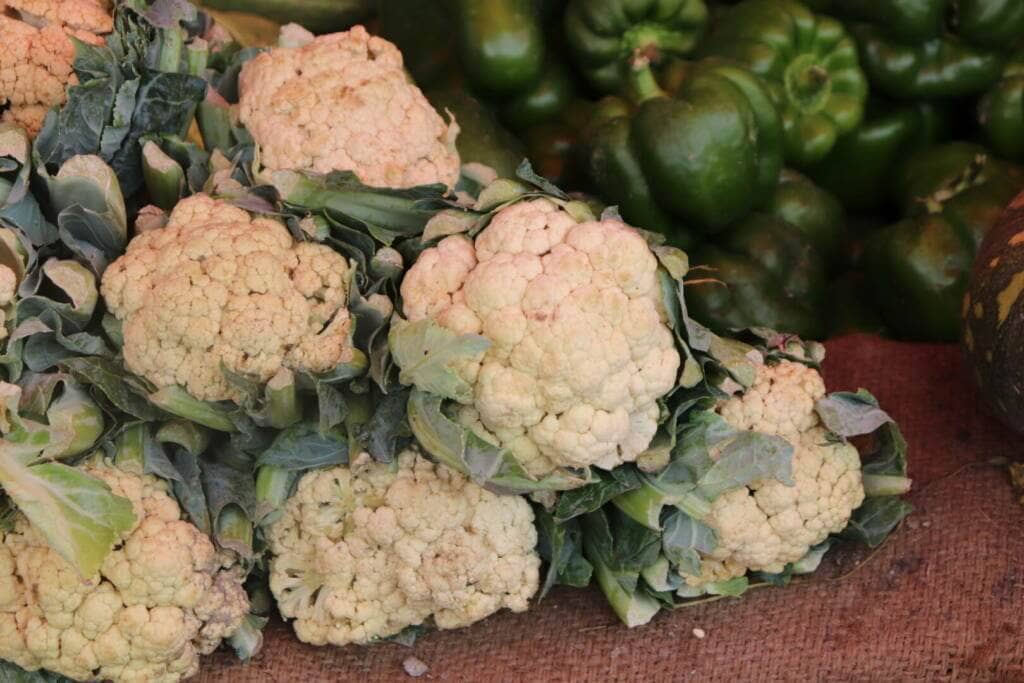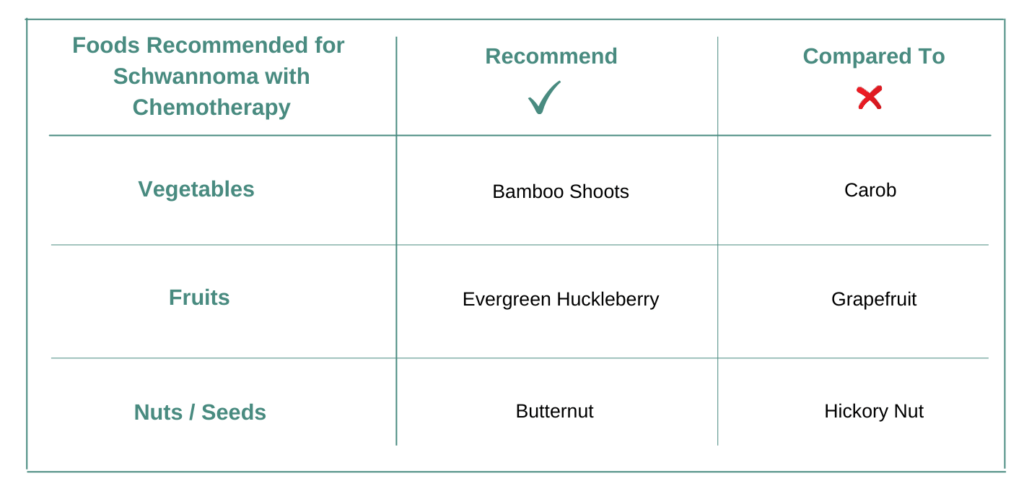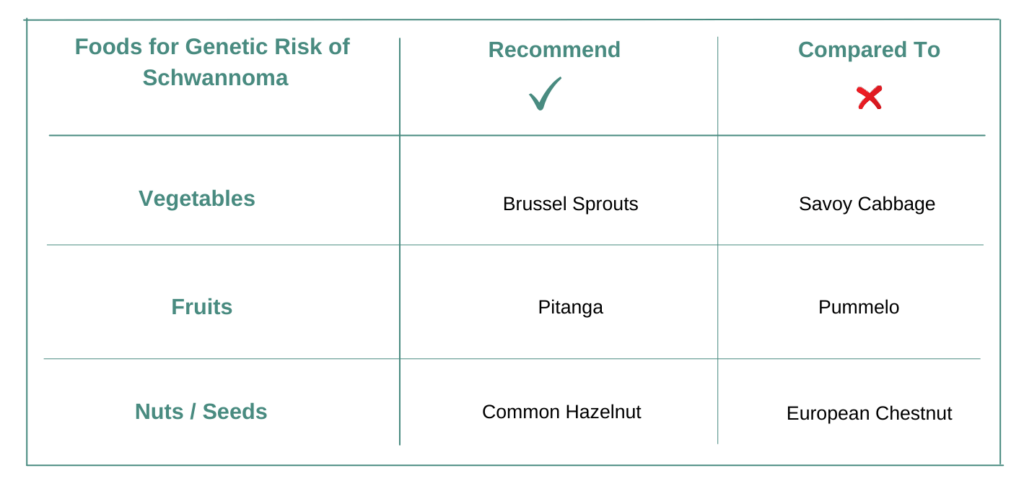Introduction
Foods for Schwannoma should be personalized for each individual and also must adapt when cancer treatment or tumor genetic change. The personalization and adaptation must consider all the active ingredients or bioactives contained in different foods with respect to cancer tissue biology, genetics, treatments, lifestyle conditions and diet preferences. Hence while nutrition is one of the very important decisions for a cancer patient and individual at risk of cancer to make – how to choose foods to eat is not an easy task.
Schwannoma is a rare tumor that develops from Schwann cells in the peripheral nervous system or nerve roots. Schwann cells wrap around peripheral nerves to provide protection and support and help in the conduction of nerve impulses. Schwannomas are mostly benign (noncancerous) but can be malignant sometimes. They are usually slow-growing tumors. Schwannomas affect about 200,000 people each year in the United States and about 60% of benign Schwannomas are vestibular Schwannoma. Vestibular Schwannoma occurs in the nerve in the inner year. It is the most common area for the Schwannoma to develop and it is also known as acoustic neuroma. Vestibular Schwannoma, when it grows, can affect the hearing and balance nerves, and usually cause hearing loss in the affected ear, tinnitus (ringing in the ear), and dizziness. Schwannomas if cancerous or malignant, most often affect the sciatic nerve in the leg or the brachial plexus nerve in the arm. Schwannomas mostly affect people in the ages of 50-60 years, and they rarely occur in children. Symptoms of Schwannomas include a visible lump that may feel tender, numbness, muscle weakness, a pain that is aching or burning or sharp since it impacts the nerves. Schwannoma treatment options include the watch and wait strategy, surgery, and radiation therapy, and for malignant Schwannomas, they may be treated with immunotherapy and chemotherapy. Prognosis for Schwannoma is usually good, and the tumor does not recur once it has been totally removed. Supportive care with optimal nutrition (foods and natural supplements) with inherent bioactives that can target the disease pathways, can also help improve patients’ well-being.
For Schwannoma does it matter what vegetables, fruits, nuts, seeds one eats?
A very common nutrition question asked by cancer patients and individuals at-genetic risk of cancer is – for cancers like Schwannoma does it matter what foods I eat and which I do not? Or if I follow a plant-based diet is that enough for cancer like Schwannoma?
For example does it matter if vegetable Bamboo Shoots is consumed more compared to Carob? Does it make any difference if fruit Grapefruit is preferred over Evergreen Huckleberry? Also if similar choices are made for nuts/seeds like Butternut over Hickory Nut and for pulses like Winged Bean over Catjang Pea. And if what I eat matters – then how does one identify foods which are recommended for Schwannoma and is it the same answer for everyone with the same diagnosis or genetic risk?
Yes! Foods you eat matters for Schwannoma!
Food recommendations may not be the same for everyone and can be different even for the same diagnosis and genetic risk.

All foods (vegetables, fruits, nuts, seeds, pulses, oils etc.) and nutritional supplements are made up of more than one active molecular ingredient or bio-actives in different proportions and quantities. Each active ingredient has a unique mechanism of action – which can be activation or inhibition of different biochemical pathways. Simply stated foods and supplements which are recommended are those which do not cause an increase of molecular drivers of cancer but reduce them. Else those foods should not be recommended. Foods contain multiple active ingredients – hence when evaluating foods and supplements you need to consider the impact of all active ingredients cumulatively rather than individually.
For example Grapefruit contains active ingredients Curcumin, Lupeol, Lycopene, Psoralen, Phloretin. And Evergreen Huckleberry contains active ingredients Curcumin, Lycopene, Caffeine, Lupeol, Daidzein and possibly others.
A common mistake made when deciding and choosing foods to eat for Schwannoma – is to evaluate only selected active ingredients contained in foods and ignore the rest. Because different active ingredients contained in foods may have opposing effects on cancer drivers – you cannot cherry pick active ingredients in foods and supplements for making a nutrition decision for Schwannoma.
YES – FOOD CHOICES MATTER FOR CANCER. NUTRITION DECISIONS MUST CONSIDER ALL ACTIVE INGREDIENTS OF FOODS.
Skills Needed for Nutrition Personalization for Schwannoma?
Personalized nutrition for cancers like Schwannoma consists of recommended foods / supplements; not recommended foods / supplements with example recipes which prioritize use of recommended foods. An example of personalized nutrition can be seen at this link.
Deciding which foods are recommended or not is extremely complicated, requiring expertise in Schwannoma biology, food science, genetics, biochemistry along with good understanding of how cancer treatments work and associated vulnerabilities by which the treatments could stop being effective.
MINIMUM KNOWLEDGE EXPERTISE NEEDED FOR NUTRITION PERSONALIZATION FOR CANCER ARE: CANCER BIOLOGY, FOOD SCIENCE, CANCER TREATMENTS AND GENETICS.
Foods to Eat After Cancer Diagnosis!
No two cancers are the same. Go beyond the common nutrition guidelines for everyone and make personalized decisions about food and supplements with confidence.
Characteristics of cancers like Schwannoma
All cancers like Schwannoma can be characterized by a unique set of biochemical pathways – the signature pathways of Schwannoma. Biochemical pathways like DNA Repair, Oncogenic Cancer Epigenetics, Suppressive Histone Methylation, Cell Cycle Checkpoints are part of the signature definition of Schwannoma. Each individual’s cancer genetics can be different and hence their specific cancer signature could be unique.
The treatments which are effective for Schwannoma need to be cognizant of the associated signature biochemical pathways for each cancer patient and individual at genetic risk. Therefore different treatments with different mechanisms of actions are effective for different patients. Similarly and for the same reasons foods and supplements need to be personalized for each individual. Hence some foods and supplements are recommended for Schwannoma when taking cancer treatment Trametinib, and some foods and supplements are not recommended.
Sources like cBioPortal and many others provide population representative patient anonymized data from clinical trials for all cancer indications. This data consists of clinical trial study details like sample size / number of patients, age groups, gender, ethnicity, treatments, tumor site and any genetic mutations.
PPM1D, NF2, ASXL1, PRKAR1A and BRCA1 are the top ranked reported genes for Schwannoma. PPM1D is reported in 27.3 % of the representative patients across all clinical trials. And NF2 is reported in 18.2 %. The combined population patient data cover ages from 11 to 88. 38.9 % of the patient data are identified as men. The Schwannoma biology along with reported genetics together define the population represented signature biochemical pathways for this cancer. If the individual cancer tumor genetics or genes contributing to the risk are also known then that should also be used for nutrition personalization.
NUTRITION CHOICES SHOULD MATCH WITH EACH INDIVIDUAL’S CANCER SIGNATURE.
Food and Supplements for Schwannoma
For Cancer Patients
Cancer patients on treatment or on palliative care need to make decisions on food and supplements – for the needed dietary calories, for managing any treatment side effects and also for improved cancer management. All plant-based foods are not equal and choosing and prioritizing foods which are personalized and customized to ongoing cancer treatment is important and complicated. Here are some examples providing guidelines for making nutrition decisions.
Choose Vegetable BAMBOO SHOOTS or CAROB?
Vegetable Bamboo Shoots contains many active ingredients or bioactives such as Curcumin, Lupeol, Psoralen, Phloretin, Daidzein. These active ingredients manipulate various biochemical pathways like DNA Repair and MYC Signaling and others. Bamboo Shoots is recommended for Schwannoma when ongoing cancer treatment is Trametinib. This is because Bamboo Shoots modifies those biochemical pathways which have been scientifically reported to sensitize the effect of Trametinib.
Some of the active ingredients or bioactives in vegetable Carob are Curcumin, Lupeol, Psoralen, Phloretin, Daidzein. These active ingredients manipulate various biochemical pathways like DNA Repair and MYC Signaling and others. Carob is not recommended for Schwannoma when ongoing cancer treatment is Trametinib because it modifies those biochemical pathways which make the cancer treatment resistant or less responsive.
VEGETABLE BAMBOO SHOOTS IS RECOMMENDED OVER CAROB FOR Schwannoma AND TREATMENT Trametinib.
Choose Fruit EVERGREEN HUCKLEBERRY or GRAPEFRUIT?
Fruit Evergreen Huckleberry contains many active ingredients or bioactives such as Curcumin, Lycopene, Caffeine, Lupeol, Daidzein. These active ingredients manipulate various biochemical pathways like DNA Repair and MYC Signaling and others. Evergreen Huckleberry is recommended for Schwannoma when ongoing cancer treatment is Trametinib. This is because Evergreen Huckleberry modifies those biochemical pathways which have been scientifically reported to sensitize the effect of Trametinib.
Some of the active ingredients or bioactives in fruit Grapefruit are Curcumin, Lupeol, Lycopene, Psoralen, Phloretin. These active ingredients manipulate various biochemical pathways like MYC Signaling and others. Grapefruit is not recommended for Schwannoma when ongoing cancer treatment is Trametinib because it modifies those biochemical pathways which make the cancer treatment resistant or less responsive.
FRUIT EVERGREEN HUCKLEBERRY IS RECOMMENDED OVER GRAPEFRUIT FOR Schwannoma AND TREATMENT Trametinib.
Choose Nut BUTTERNUT or HICKORY NUT?
Butternut contains many active ingredients or bioactives such as Curcumin, Lupeol, Lycopene, Caffeine, Psoralen. These active ingredients manipulate various biochemical pathways like DNA Repair and MYC Signaling and others. Butternut is recommended for Schwannoma when ongoing cancer treatment is Trametinib. This is because Butternut modifies those biochemical pathways which have been scientifically reported to sensitize the effect of Trametinib.
Some of the active ingredients or bioactives in Hickory Nut are Curcumin, Lupeol, Caffeine, Lycopene, Daidzein. These active ingredients manipulate various biochemical pathways like DNA Repair and MYC Signaling and others. Hickory Nut is not recommended for Schwannoma when ongoing cancer treatment is Trametinib because it modifies those biochemical pathways which make the cancer treatment resistant or less responsive.
BUTTERNUT IS RECOMMENDED OVER HICKORY NUT FOR Schwannoma AND TREATMENT Trametinib.

For Individuals with Genetic Risk of Cancer
The question asked by individuals who have genetic risk of Schwannoma or familial history is “What Should I Eat Differently from Before?” and how they should choose foods and supplements to manage risks of the disease. Since for cancer risk there is nothing actionable in terms of treatment – decisions of foods and supplements become important and one of the very few actionable things which can be done. All plant-based foods are not equal and based on identified genetics and pathway signature – the choices of food and supplements should be personalized.
Choose Vegetable BRUSSEL SPROUTS or SAVOY CABBAGE?
Vegetable Brussel Sprouts contains many active ingredients or bioactives such as Curcumin, Lupeol, Formononetin, Genistein, Bergapten. These active ingredients manipulate various biochemical pathways like P53 Signaling and Angiogenesis and others. Brussel Sprouts is recommended for risk of Schwannoma when associated genetic risk is ASXL1. This is because Brussel Sprouts increases those biochemical pathways which counteract the signature drivers of it.
Some of the active ingredients or bioactives in vegetable Savoy Cabbage are Curcumin, Lupeol, Lycopene, Formononetin, Genistein. These active ingredients manipulate various biochemical pathways like DNA Repair and Cytoskeletal Dynamics and others. Savoy Cabbage is not recommended when risk of Schwannoma when associated genetic risk is ASXL1 because it increases the signature pathways of it.
VEGETABLE BRUSSEL SPROUTS IS RECOMMENDED OVER SAVOY CABBAGE FOR ASXL1 GENETIC RISK OF CANCER.
Choose Fruit PITANGA or PUMMELO?
Fruit Pitanga contains many active ingredients or bioactives such as Apigenin, Curcumin, Quercetin, Lupeol, Lycopene. These active ingredients manipulate various biochemical pathways like Stem Cell Signaling, P53 Signaling, Angiogenesis and NFKB Signaling and others. Pitanga is recommended for risk of Schwannoma when associated genetic risk is ASXL1. This is because Pitanga increases those biochemical pathways which counteract the signature drivers of it.
Some of the active ingredients or bioactives in fruit Pummelo are Apigenin, Curcumin, Quercetin, Lupeol, Lycopene. These active ingredients manipulate various biochemical pathways like DNA Repair, Stem Cell Signaling and Cytoskeletal Dynamics and others. Pummelo is not recommended when risk of Schwannoma when associated genetic risk is ASXL1 because it increases the signature pathways of it.
FRUIT PITANGA IS RECOMMENDED OVER PUMMELO FOR ASXL1 GENETIC RISK OF CANCER.
Choose Nut COMMON HAZELNUT or EUROPEAN CHESTNUT?
Common Hazelnut contains many active ingredients or bioactives such as Curcumin, Quercetin, Lupeol, Lycopene, Formononetin. These active ingredients manipulate various biochemical pathways like DNA Repair, P53 Signaling, Cytoskeletal Dynamics and Angiogenesis and others. Common Hazelnut is recommended for risk of Schwannoma when associated genetic risk is ASXL1. This is because Common Hazelnut increases those biochemical pathways which counteract the signature drivers of it.
Some of the active ingredients or bioactives in European Chestnut are Apigenin, Curcumin, Quercetin, Lupeol, Ellagic Acid. These active ingredients manipulate various biochemical pathways like DNA Repair, Stem Cell Signaling and Cytoskeletal Dynamics and others. European Chestnut is not recommended when risk of Schwannoma when associated genetic risk is ASXL1 because it increases the signature pathways of it.
COMMON HAZELNUT IS RECOMMENDED OVER EUROPEAN CHESTNUT FOR ASXL1 GENETIC RISK OF CANCER.

In Conclusion
Foods and Supplements chosen are important decisions for cancers like Schwannoma. Schwannoma patients and individuals with genetic-risk always have this question: “What foods and nutritional supplements are recommended for me and which are not?” There is a common belief which is a misconception that all plant-based foods could be beneficial or not but would not be harmful. Certain foods and supplements can interfere with cancer treatments or promote molecular pathway drivers of cancer.
There are different types of cancer indications like Schwannoma, each with different tumor genetics with further genomic variations across each individual. Further every cancer treatment and chemotherapy has a unique mechanism of action. Each food like Bamboo Shoots contains various bioactives in different quantities, which have an impact on different and distinct sets of biochemical pathways. The definition of personalized nutrition is individualized food recommendations for the cancer indication, treatments, genetics, lifestyle and other factors. Nutrition personalization decisions for cancer require knowledge of cancer biology, food science and an understanding of different chemotherapy treatments. Finally when there are treatment changes or new genomics is identified – the nutrition personalization needs re-evaluation.
The addon nutrition personalization solution makes the decision making easy and removes all the guesswork in answering the question, “What foods should I choose or not choose for Schwannoma?”. The addon multi-disciplinary team includes cancer physicians, clinical scientists, software engineers and data scientists.
Personalized Nutrition for Cancer!
Cancer changes with time. Customize and modify your nutrition based on cancer indication, treatments, lifestyle, food preferences, allergies and other factors.
References
- Msk Impact 2017
- Cancer therapy shapes the fitness landscape of clonal hematopoiesis.
- Retinol decreases beta-catenin protein levels in retinoic acid-resistant colon cancer cell lines.
- Brassinin inhibits STAT3 signaling pathway through modulation of PIAS-3 and SOCS-3 expression and sensitizes human lung cancer xenograft in nude mice to paclitaxel.
- Negative regulation of signal transducer and activator of transcription-3 signalling cascade by lupeol inhibits growth and induces apoptosis in hepatocellular carcinoma cells.
- https://www.st-va.ncbi.nlm.nih.gov/books/NBK562312
- https://my.clevelandclinic.org/health/diseases/17877-schwannoma
- https://www.cancer.gov/pediatric-adult-rare-tumor/rare-tumors/rare-soft-tissue-tumors/schwannoma
